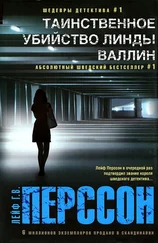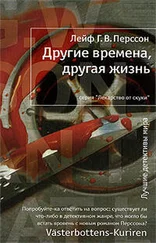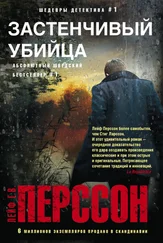When they returned to their office after lunch the excellent Gunsan had solved Holt’s mystery of the mysteriously dedicated books, despite the fact that she wasn’t even aware of the problem. On Jarnebring’s desk was a typewritten sheet of paper on which Gunsan had compiled what she, with the help of the police department’s telephones and computers, had produced about Eriksson’s background. Jarnebring took it and started reading while Holt — for the millionth time — started thumbing through her own piles of papers.
“Okay, it’s clear,” Jarnebring suddenly exclaimed. “Look at this,” he said, handing over the paper with Gunsan’s notes on Eriksson’s history.
It appeared that Eriksson had worked as a mail carrier in Stockholm during the years from 1964 to 1975. First as a substitute mail carrier and then as a temporary, at the two post offices whose delivery areas included Djurgården and the tonier parts of Östermalm. At the age of thirty-one, when he completed his part-time studies at the University of Stockholm with a degree in sociology, criminology, and education, he also quit the post office and got a job instead as an assistant statistician at the Central Bureau of Statistics.
“But why did he steal books?” said Holt, looking inquisitively at Jarnebring.
“Maybe he stole other things too,” Jarnebring sneered. “Who cares? This is already past the statute of limitations, and he’s dead anyway.”
“But books,” Holt persisted.
“I guess he liked to read,” said Jarnebring, smiling.
Holt shook her head.
“I think he was snooping,” she said. “I’m pretty sure that Eriksson was an extremely snoopy type.”
In the afternoon the detective team met as usual and again took stock of how the investigation was going. As of yet nothing had been produced that was even reminiscent of a breakthrough.
“I don’t understand this guy,” Jarnebring muttered. “He doesn’t seem to have known a soul. Well, besides those two you wanted to question,” he added, looking inquisitively at Bäckström. “How did that go, by the way?”
“It’ll work out, it’ll work out,” said Bäckström evasively, and instead launched into a lengthy exposition of his pet homo theory, on which he and his colleagues had evidently put in some comprehensive work. Gunsan had searched out a large number of conceivable murderers of gay men, identified those who according to the computer already had something else going, for example, were sitting in prison or in one of the mental institutions for the criminally insane, and turned the rest back to Bäckström, Alm, and the others who had already questioned a number of them. Without any results, however.
“We’ll find him,” said Bäckström credulously. “There’s some little fairy out there that Eriksson had contact with or just picked up when he had the chance, and sooner or later we’ll run into him.”
The hell we will, thought Jarnebring doubtfully, and if a murder investigation could be compared to a soup, then this was pretty thin.
The checks on Eriksson’s telephone were done and had not produced anything in particular. The calls he made from his home phone usually went to the switchboard at the brokerage firm that managed his stock transactions. There were also occasional calls directly to Tischler, Welander, or his cleaning woman’s home phone.
The autopsy was complete, but if you disregarded Esprit and Wiijnbladh’s so-called interpretations of the victim’s personality, it basically conveyed no more than what Jarnebring had understood with his own eyes when he found Eriksson dead on the floor in his living room.
Same thing with the technical investigations. Prints from a small number of persons of which the two most common samples had already been identified as Eriksson’s and his cleaning woman’s. But none that could be found in the police files, and other clues were sparse as well. The hand towel that had been found in the laundry basket in Eriksson’s bathroom was still at the crime lab. As usual they were overworked and a report was unlikely to arrive before Christmas, despite the fact that Wiijnbladh had called to nudge them.
Instead the team members sat around arguing about a lot of irritating details that would certainly prove to be completely uninteresting once things got to the point. A safe-deposit box key that was missing, for example. An entire half hour of sometimes animated discussion had been devoted to this, and it was Jarnebring who brought it up, although this had not really been his intention.
Supposing it was the case that Eriksson had been killed by a male prostitute he had picked up. Why was there nothing to indicate he had been robbed? As far as Jarnebring and Holt and even Wiijnbladh and his colleagues had been able to ascertain, nothing particular was missing from Eriksson’s apartment. Apart from a suitcase, probably a few hand towels, and possibly a number of papers. Despite the fact that there were various things that ought to have tempted an ordinary robber. Three expensive watches and a number of other personal items, such as a gold currency clip.
“We don’t actually know that,” Bäckström objected. “I’m a hundred percent sure that he emptied his safe-deposit box that day, so he could have had piles of dough at home.” Although it doesn’t need to be that bad, he thought, almost feeling a shudder as he did so. That would be simply too annoying, he thought.
“I don’t believe it,” said Jarnebring doubtfully. “If there’s anything that has disappeared it’s probably some of his papers that someone has taken. That thing with the hand towels is far from certain, and as for the suitcase it may just be that the perpetrator needed it to carry away the papers he may have taken.”
You really are a true detective, Jarnebring, thought Bäckström, nonetheless deciding to mess a little with the big ape-man, since he still had the victim’s suitcase in his possession, although he had always intended to put it back as soon as things had settled down.
“What papers?” asked Bäckström, suddenly seeming rather contentious. “What kind of papers would they be?”
Jarnebring just shrugged his shoulders. He had never brought up the empty drawer in Eriksson’s desk, though he had thought about it, while stupidly he had mentioned the missing safe-deposit box key instead. Eriksson had signed out two safe-deposit box keys from Handelsbanken. One had been found but one was still missing, despite Jarnebring’s and Holt’s dogged searching. Where was it?
The proffered suggestions ranged across the whole field, from that it had ended up in the murderer’s own pants pocket to that it had simply been lost. Which by the way was often how things turned out when you had two identical keys, despite the fact that you only needed one. Didn’t everyone know that from their own experience?
When they were finally done and everyone had had their say, the day was basically over. In a few hours it would have been a week since Eriksson had been murdered, and they still did not have their hands on any culprit worthy of the name.
12
Friday, December 8, 1989
On Friday morning Inspector Alm provoked his colleague Bäckström’s displeasure.
Without talking with Bäckström, he phoned TV reporter Sten Welander at the national television news to set a time for a conversation about Welander’s old acquaintance Kjell Eriksson.
Welander was friendly and businesslike; he looked forward to meeting with the police and pointed out in passing that he had called them first, as early as Friday morning a week ago, as soon as he had heard about the tragic event. Not because he thought he could contribute much in particular, but he could scarcely be the judge of that. If he himself could propose a time, it would be either within an hour or two or else in fourteen days, because he would be traveling abroad in connection with a major news story he was working on. And if they wanted to meet with him immediately it had to be at his office in the TV building as he had a number of other meetings later in the day that were already scheduled and could not be changed.
Читать дальше












